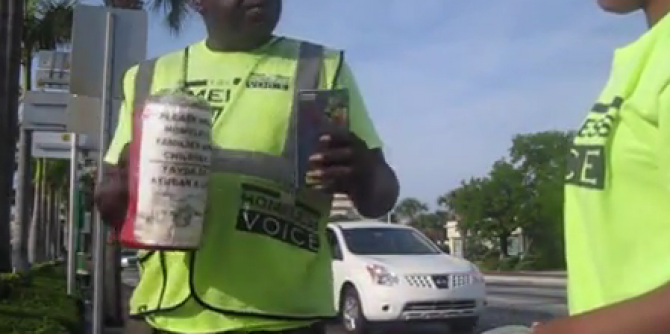By Te-Erika Patterson
(Originally published in The Westside Gazette)
The Pitfalls of Homelessness
During the 4 months I spent living at the COSAC Homeless Shelter in Hollywood, Florida as part of The Rebuild Your Life Project, I was a witness to many of the attitudes and behaviors that have influenced the perpetual lifestyle of the homeless individual.
The Homeless Costume
I bit my lip as I took a giant step over the trail of urine leading into the gutter. I sat down a couple of feet away, crossed legged on the sidewalk in the middle of the day, as though this was not out of the ordinary.
She looked over at me. I spoke to her as though we had been friends since elementary school and she was clearly getting on my nerves, “Why in the world are you sitting out here in this piss? Why won’t you come into the shelter and take a shower? Come on!”
She shook her head, “I tried to go in there but they won’t listen to me. I’ll just stay here until I figure out what to do.”
She never told me her real name but she did say that she was 42. She explained that “Spanish people” were following her and there was no one she could trust. Her hair was swept back into an unkempt ponytail. The only hint of her age was the fact that she had laugh lines around her eyes. She sat anchored in one spot for more than 48 hours surrounded by clear plastic bags of clothing and random food that strangers had given her. The stench of dried feces and fresh urine masked by gasoline fumes from the cars driving by made me ask her again, “Please come into the shelter and take a shower.”
“No,” she said. “When I’m like this, no one will bother me. At least everyone will leave me alone.”
Police Brutality
“I need a cigarette,” he grunted as two COSAC shelter security guards led him to rest on a bench after picking him up from jail. I quickly retrieved one from my stash, lit it for him and put it in his mouth. I watched it dangle from his lips as he curled up on the bench in a fetal position. “They beat me up,” he mumbled as I began walking away.
I turned back.
“They beat me up,” he said again and the lit cigarette fell to the ground.
Weeks later I saw him again. He had regained his strength by then. He told me the story of being out on the street and being stopped by the Hollywood Police Department. He said he had been drinking and they took him to an empty parking lot and beat him before hauling him off to jail.
“They beat you up?” I asked incredulously, my chest burning with anxiety at the mere mention of such an atrocity. “Why? Why would they hit you?”
“Because they can, Tee,” he told me and shrugged. “They can do anything they want. They’re the police. I’m just a homeless person.”
Invisibility
It is slightly after 9pm on Sunday and the cafeteria is filled with gospel music. The contemporary tempo is drowned out by the pastor singing into the microphone, song after song after song while the COSAC shelter residents stand and clap and offer praise.
When the praise and worship session is over the pastor stands before the crowd and offers an encouraging word about salvation and starting over.
“Repeat after me,” the pastor says. “I am.”
“I am,” we repeat.
“Somebody,” he says.
“Somebody.”
“I am.”
“I am.”
“Somebody.”
“Somebody.”
I stand there repeating her out of respect for her time. My lips are curled as I shake my head and mutter, “We don’t need this. You are the one who thinks we’re not somebody. We already know we’re somebody. You don’t even see us.”
The Revolving Door Becomes A Trap
“But what are they supposed to do?” I ask Sean Canonie, the owner of the COSAC Homeless Shelter. I was well on my way to saving for my own place to live and several of the shelter residents had approached me about being roommates. I wanted them to move up with me but Canonie didn’t think it was wise.
“They’re always complaining about being here. They’re grown. They need to move out on their own,” I say to him, not understanding why he is suggesting that it isn’t a good idea for me to help anyone leave.
“Te-Erika,” he says to me. “How many times has she overdosed on drugs in the 4 months you’ve been here?”
“Once,” I reply. Canonie eyes lock with mine before allowing his gaze to float toward the floor.
“Te-Erika. She has overdosed more than five times since you’ve been here. Just yesterday we had to pull her off the street. We have to check on her every night just in case. She can not be alone. You can not be responsible for her.”
“But she says she can take care of herself!” I plead. “I think she can do it; she is so smart!”
“Te-Erika,” Canonie speaks firmly and deliberately. “She will die if she leaves.”
NEXT- Part 4- The Homeless Mentality
To learn more about The Rebuild Your Life Project please visit The Rebuild Your Life Project.org

